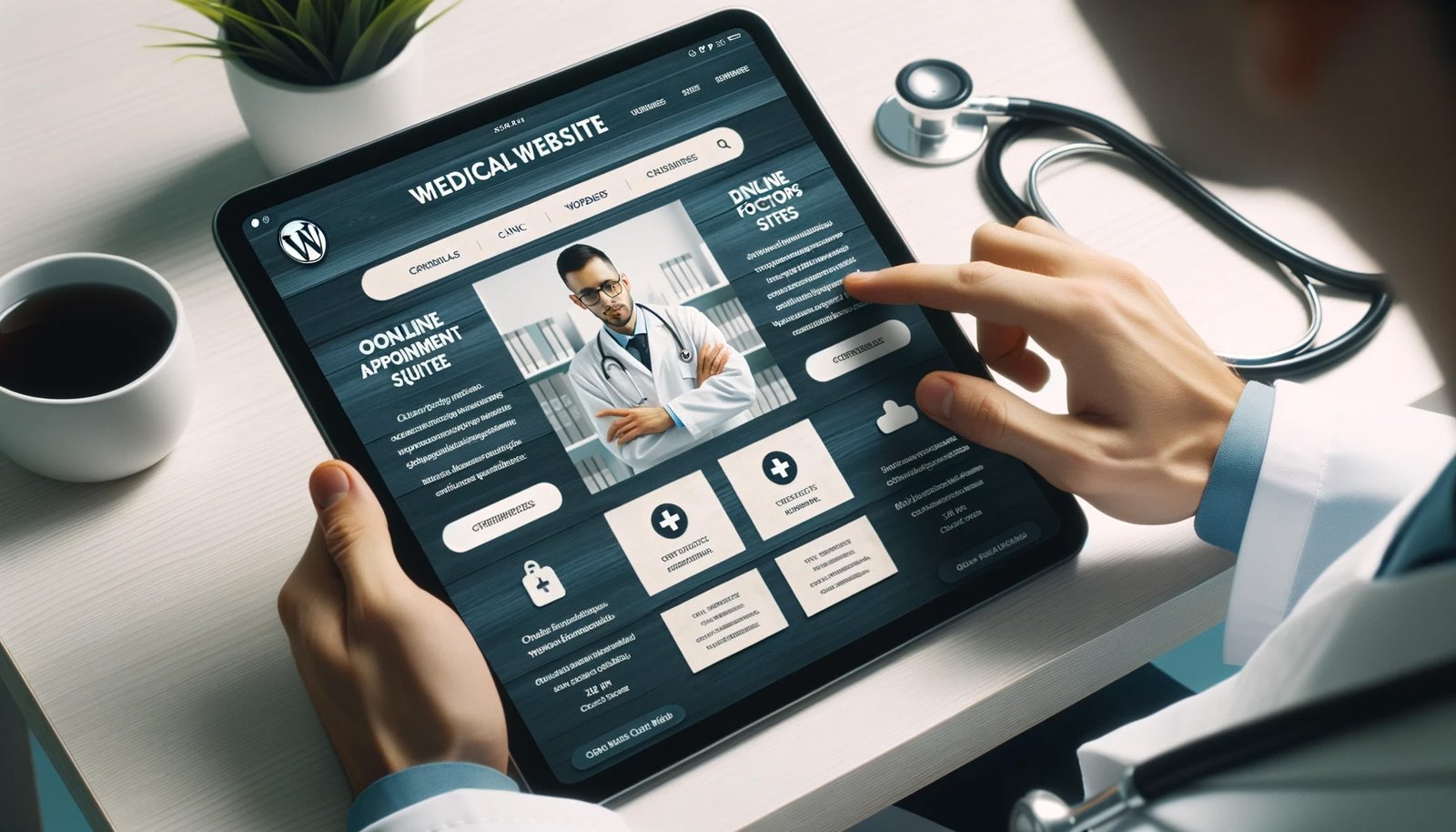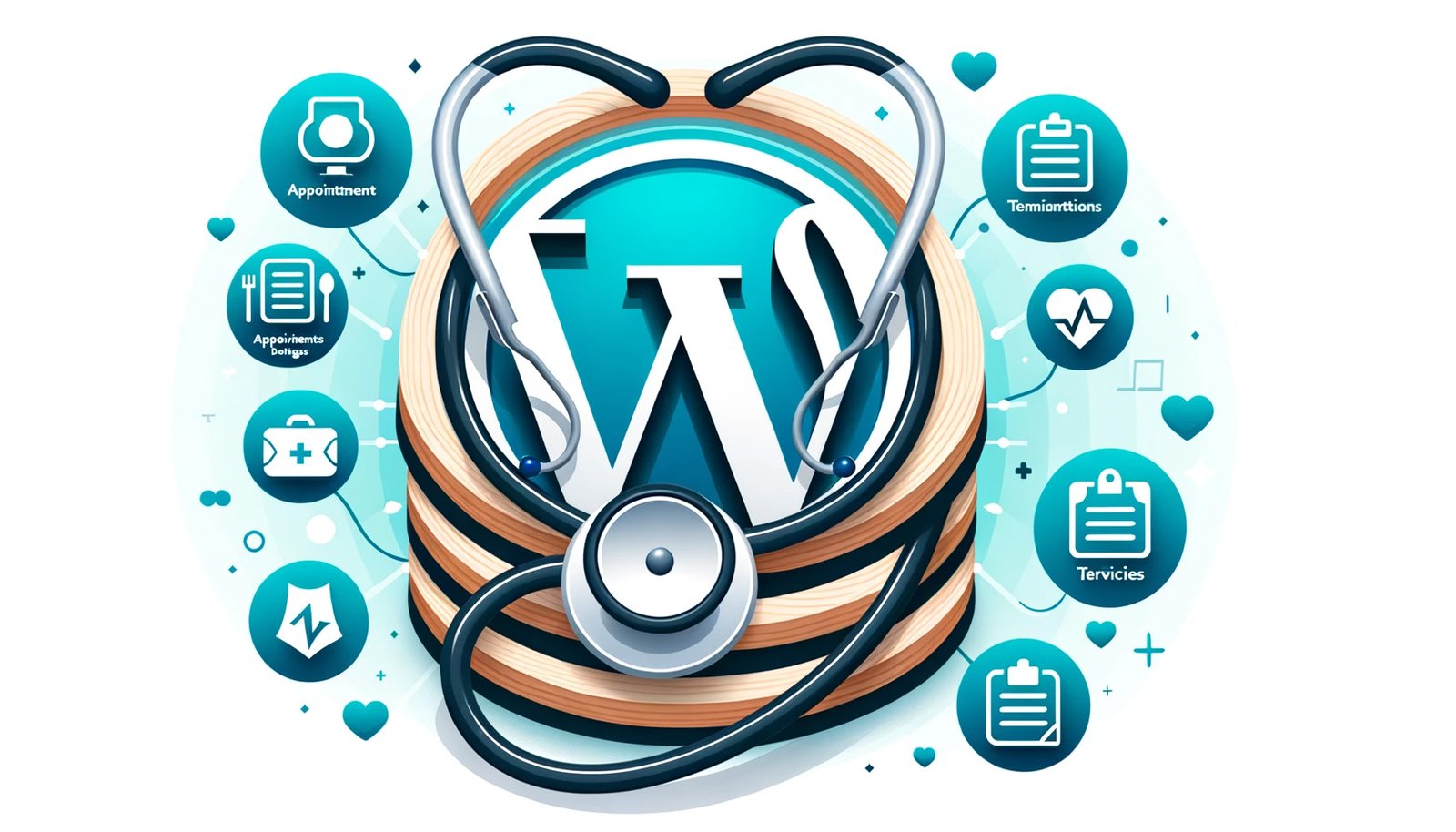Table of Contents
Toggle- Introduction – WordPress Medical Websites
- Starting Right: Creating a Medical Website with WordPress
- Professionalism at Its Best: Crafting a Professional Medical Website
- Adapting to All Screens: Creating a Responsive Medical Website
- Reaching a Global Audience: Setting Up a Multilingual Medical Website
- Safety First: Ensuring a Secure Medical Website
- Universal Access: Crafting an Accessible Medical Website
- Prioritizing User Experience: Designing a User-Friendly Medical Website
- Informative and Engaging: Building a Content-Rich Medical Website
- Aesthetics Matter: Designing a Visually Appealing Medical Website
- Optimized for Mobile: Ensuring a Mobile-Friendly Medical Website
- Staying Connected: Integrating Social Media into Your Medical Website
- Streamlining Appointments: Online Scheduling on Your Medical Website
- Empowering Patients: Integrating Patient Portals
- Monetizing Digital Services: E-commerce Functionality for Medical Websites
- Targeted Medical Niches: Tailoring Your Website for Specific Specialties, Practices, and Conditions
- Sharing Knowledge: Setting Up a Medical Blog on WordPress
- Reaching Audiences Through Audio: Creating a Medical Podcast
- Visual Health Education: Setting Up a Medical Video Channel
- Promoting Your Medical Expertise: Effective Website Promotion Strategies
- Staying on Top: Tracking Website Performance and Analytics
- Regular Upkeep: Maintaining and Updating Your Medical Website
- Conclusion
WordPress Medical Websites: The Complete Guide to Creating a Professional and Patient-Friendly Website
Introduction – WordPress Medical Websites
In an era where digital health is rapidly evolving, the significance of a robust online presence for medical professionals cannot be understated. Amidst this digital transformation, WordPress emerges as a beacon, reshaping the landscape of medical websites and offering unparalleled flexibility and functionality.
The Rise of Digital Health and the Importance of Online Presence for Medical Professionals
The digital health revolution is upon us. From telemedicine consultations to AI-driven diagnostics, the medical field is experiencing a seismic shift. In this digital age, a medical professional’s online presence serves as the first point of contact for many patients. A well-crafted website can offer insights, foster trust, and even facilitate appointments, making it an indispensable tool for modern medical practices.
The Role of WordPress in Transforming the Medical Website Landscape
WordPress, renowned for its user-friendly interface and vast plugin ecosystem, has become the linchpin for many medical websites. Its adaptability allows medical professionals to tailor their sites to specific needs, be it showcasing expertise, booking appointments, or offering telehealth services. With its robust features, WordPress is not just a platform; it’s a catalyst for change in the realm of WordPress Medical Websites.

Starting Right: Creating a Medical Website with WordPress
Embarking on the journey of creating a medical website might seem daunting. However, with WordPress at the helm, the process becomes streamlined and intuitive.
The Ease and Flexibility of WordPress as a Platform
WordPress, with its open-source nature, offers unparalleled flexibility. Whether you’re a solo practitioner aiming for a minimalist design or a multi-speciality hospital seeking intricate features, WordPress caters to all. Its vast repository of themes and plugins ensures that medical professionals can craft sites that resonate with their ethos and cater to their patient’s needs.
Key Considerations When Setting Up a Medical Website
While WordPress offers a plethora of tools, it’s essential to approach website creation with a clear strategy. Understand your target audience, be it patients, fellow professionals, or medical students. Ensure the site’s navigation is intuitive and the content is both informative and engaging. Prioritize security, especially when handling patient data, and ensure the website is compliant with medical regulations and standards.
Professionalism at Its Best: Crafting a Professional Medical Website
In the medical field, trust and credibility are paramount. Your website serves as a reflection of your expertise and ethos, making its professionalism crucial.
Importance of Trust and Credibility in the Medical Field
Patients entrust medical professionals with their well-being. This trust is fostered not just through in-person interactions but also through digital touchpoints like websites. A professionally crafted website, with clear information, credentials, and patient testimonials, can bolster a medical professional’s credibility.
Themes and Plugins that Enhance Professionalism
WordPress offers a myriad of themes tailored to the medical field. Themes like “MediCenter” or “MedicalPress” are designed with medical professionals in mind, ensuring a balance of aesthetics and functionality. Plugins, on the other hand, can enhance features, be it appointment booking, patient portals, or even telehealth integrations.
Adapting to All Screens: Creating a Responsive Medical Website
In today’s fast-paced world, patients access medical information from a plethora of devices, ranging from desktops to smartphones. Ensuring your medical website is responsive is no longer a luxury; it’s a necessity.
The Significance of Mobile Responsiveness in Today’s Digital Age
Over half of global web traffic now originates from mobile devices. Patients might seek a quick consultation while on the move or research a medical condition during a commute. A responsive website ensures that irrespective of the device’s screen size, the user experience remains seamless, and the content is easily accessible.
Tips and Tools for Ensuring Seamless User Experience Across Devices
WordPress, with its forward-thinking approach, offers inherently responsive themes. However, it’s crucial to periodically test your website on various devices. Tools like “WPtouch” or “Responsive Menu” can further enhance mobile navigation. Moreover, always prioritize content clarity, ensuring that text remains legible and images adjust appropriately across screens.
Reaching a Global Audience: Setting Up a Multilingual Medical Website
As medical knowledge transcends borders, so should your website. Catering to a diverse patient demographic can set your practice apart, and a multilingual website is the first step in that direction.
Catering to Diverse Patient Demographics
Whether you’re based in a multicultural city or offering telehealth services globally, a multilingual website can resonate with a broader audience. It showcases cultural sensitivity and ensures that patients, irrespective of their linguistic background, can access crucial medical information.
Plugins and Strategies for Effective Multilingual Integration
WordPress offers a suite of plugins like “WPML” or “Polylang” that make multilingual integration a breeze. These tools allow for content translation, ensuring that the essence of the message remains consistent across languages. It’s also beneficial to be aware of cultural nuances and tailor content accordingly, ensuring it resonates with each specific audience.
Safety First: Ensuring a Secure Medical Website
In the realm of healthcare, where patient data is sacrosanct, website security is paramount. A breach can not only lead to legal repercussions but can also erode the hard-earned trust of patients.
The Critical Nature of Data Privacy in the Medical Field
Medical data is deeply personal. From diagnosis to treatment plans, the information is sensitive. Ensuring its privacy is not just a legal obligation but a moral one. A secure website fosters trust, assuring patients that their data is in safe hands.
Best Practices and Plugins for Top-Notch Website Security
Regular updates, strong passwords, and SSL certificates are foundational to website security. WordPress, with its commitment to safety, offers plugins like “Wordfence” or “Sucuri Security” that bolster defences, offering features like firewall protection and malware scanning. Regular backups, using tools like “UpdraftPlus”, ensure that in the event of a breach, the website can be swiftly restored.

Universal Access: Crafting an Accessible Medical Website
In healthcare, inclusivity is paramount. Ensuring that your website is accessible to all, including those with disabilities, is not just a moral imperative but often a legal one.
The Importance of Website Accessibility in Healthcare
Healthcare is a universal need. Everyone, regardless of physical or cognitive abilities, should have equal access to medical information and services. An accessible website ensures that people with disabilities can navigate, understand, and interact with the web, ensuring no one is left behind.
Tools and Strategies to Ensure ADA Compliance
WordPress offers a plethora of plugins and tools designed to enhance website accessibility. Plugins like “WP Accessibility” or “One Click Accessibility” provide features like font size adjustment, high contrast modes, and keyboard navigation. Regularly auditing your website using tools like “WAVE” or “AXE” can identify potential accessibility issues, ensuring compliance with standards like ADA or WCAG.
Prioritizing User Experience: Designing a User-Friendly Medical Website
A medical website should be more than just informative; it should be intuitive. Prioritizing user experience ensures that patients can easily access the information they seek, enhancing their trust in your medical services.
Elements of User-Centric Design in Medical Websites
Clear navigation, legible fonts, and a logical content hierarchy are foundational to user-centric design. Integrating features like search bars, FAQ sections, or chatbots can further enhance user experience, guiding patients through their online journey.
Enhancing Navigation, Readability, and Overall User Experience
WordPress themes, tailored for medical websites, often prioritize user experience. However, it’s crucial to customize these themes based on patient feedback. Tools like “Hotjar” can provide insights into user behaviour, highlighting areas of improvement. Moreover, ensuring content clarity, with concise paragraphs and relevant visuals, can significantly enhance readability.
Informative and Engaging: Building a Content-Rich Medical Website
Content is the lifeblood of any website, and in the medical field, it serves a dual purpose – educating patients and showcasing expertise.
The Role of Quality Content in Patient Education and Engagement
Well-researched and articulate content can demystify medical jargon, empowering patients to make informed decisions. From blog posts on prevalent health issues to explainer videos on complex procedures, quality content can foster patient engagement and trust.
Strategies for Content Planning and Creation
Regularly updating your website with fresh content can enhance SEO and keep patients engaged. Using WordPress’s editorial calendar or plugins like “Edit Flow” can streamline content planning. Collaborating with medical professionals ensures the content’s accuracy, while tools like “Yoast SEO” can optimize it for search engines.
Aesthetics Matter: Designing a Visually Appealing Medical Website
In the realm of healthcare, where trust is paramount, aesthetics play a pivotal role. A well-designed website can not only captivate visitors but also instil a sense of professionalism and credibility.
The Impact of Visual Design on Patient Trust and Engagement
First impressions matter. When a patient lands on a medical website, its visual design often serves as their initial interaction. A clean, modern design exudes professionalism, while relevant imagery can humanize the medical practice, fostering trust and engagement.
Tips for Choosing the Right Theme and Visual Elements
WordPress boasts a plethora of medical themes that prioritize aesthetics without compromising functionality. Themes like “MedZone” or “MedicPress” offer a balance of visual appeal and user-centric design. Incorporating authentic imagery, perhaps showcasing the medical team or facility, can further enhance trust. Additionally, tools like “Elementor” allow for drag-and-drop customization, ensuring the website aligns with the medical practice’s brand identity.
Optimized for Mobile: Ensuring a Mobile-Friendly Medical Website
With an increasing number of patients accessing medical websites via mobile devices, optimizing for mobile is no longer optional; it’s essential.
The Growing Importance of Mobile Optimization in Healthcare
Whether it’s booking an appointment on the go or reading a health blog during a commute, mobile devices have become integral to patients’ online journeys. A mobile-optimized website ensures that this journey is seamless, enhancing user experience and patient satisfaction.
Tools and Techniques for Mobile-First Design
While many WordPress themes are inherently responsive, it’s crucial to test the website across various devices. Plugins like “AMP for WP” can further enhance mobile load times, ensuring swift access to information. Moreover, prioritizing essential information, using collapsible menus, and optimizing images for mobile can significantly enhance the mobile user experience.
Staying Connected: Integrating Social Media into Your Medical Website
In today’s digital age, social media serves as a bridge, connecting medical professionals with a broader audience, fostering community engagement, and enhancing patient outreach.
The Role of Social Media in Patient Outreach and Engagement
Platforms like Facebook, Twitter, or Instagram offer medical professionals a platform to share insights, patient testimonials, or even health tips. Integrating these platforms into the medical website can drive traffic, enhance patient engagement, and foster community building.
Effective Plugins for Social Media Integration
WordPress, with its vast plugin ecosystem, offers seamless social media integration. Tools like “Smash Balloon Social Photo Feed” or “Custom Twitter Feeds” allow for real-time feed integration, ensuring the website remains dynamic and updated. Moreover, plugins like “Social Media Share Buttons” can enhance content virality, driving patient engagement.
Streamlining Appointments: Online Scheduling on Your Medical Website
In the digital age, convenience is king. Offering online appointment scheduling can significantly enhance patient experience, reducing administrative hassles and ensuring efficient time management.
The Convenience of Online Appointment Booking for Patients
Gone are the days of lengthy phone calls and back-and-forth emails. With online scheduling, patients can choose their preferred time slot, book appointments, and even receive reminders, all at the click of a button. This not only saves time but also reduces the chances of no-shows.
Best Plugins and Tools for Scheduling Integration
WordPress, ever at the forefront of innovation, offers a plethora of plugins tailored for appointment scheduling. Tools like “Bookly” or “Amelia” provide intuitive interfaces, allowing for easy appointment management. These plugins can be customized to align with the medical practice’s workflow, ensuring seamless integration.
Empowering Patients: Integrating Patient Portals
A patient portal is more than just a digital tool; it’s a gateway, fostering patient engagement, enhancing transparency, and streamlining administrative processes.
Benefits of Patient Portals for Medical Practices
Patient portals offer a centralized platform where patients can access their medical records, communicate with healthcare providers, and even manage prescriptions. This not only empowers patients, giving them control over their health data, but also reduces administrative burdens on the medical staff.
Key Features and Functionalities to Consider
When integrating a patient portal into a WordPress medical website, features like secure messaging, prescription management, and appointment history are essential. Plugins like “Patient Portal” or integrations like “MyChart” ensure that these features are seamlessly incorporated, prioritizing data security and user experience.
Monetizing Digital Services: E-commerce Functionality for Medical Websites
The digital transformation of healthcare isn’t just about information; it’s also about commerce. From health products to online consultations, monetizing digital services can open up new revenue streams for medical professionals.
Selling Health Products, Consultations, and Digital Services
Whether it’s a dermatologist selling skincare products or a nutritionist offering diet plans, e-commerce functionality can significantly enhance a medical website’s offerings. This not only provides convenience to patients but also diversifies revenue streams for medical professionals.
Best Practices for Setting Up an E-commerce Section
WordPress, with its versatile nature, offers seamless e-commerce integration, primarily through the “WooCommerce” plugin. Ensuring a secure payment gateway, clear product descriptions, and an intuitive checkout process are foundational to a successful e-commerce section. Regularly updating product listings and offering promotions can further drive sales.
Targeted Medical Niches: Tailoring Your Website for Specific Specialties, Practices, and Conditions
The medical field is vast, encompassing a myriad of specialities, practices, and conditions. A website tailored to a specific niche can resonate more deeply with its target audience, ensuring relevancy and fostering trust.
Customizing Content and Design Based on Medical Niche
Whether it’s paediatrics, cardiology, or mental health, each medical niche has its unique requirements and audience. Tailoring content to address specific concerns, using relevant imagery, and even customizing the website’s colour palette can make a significant difference in patient engagement.
Case Studies of Successful Niche Medical Websites
Consider a physiotherapy clinic that has integrated interactive exercises on its website or a dental practice offering virtual smile assessments. These niche-specific features not only enhance user experience but also position the medical practice as a leader in its field.
Sharing Knowledge: Setting Up a Medical Blog on WordPress
Blogs are powerful tools, serving as platforms for education, engagement, and even SEO enhancement.
The Power of Blogging in Patient Education and SEO
A well-maintained medical blog can demystify complex medical concepts, empower patients with knowledge, and even drive organic traffic to the website. Regularly updated content signals search engines about the website’s relevancy, potentially boosting its search rankings.
Tips for Consistent and Impactful Blogging
Choosing relevant topics, ensuring factual accuracy, and maintaining a consistent posting schedule is foundational to a successful medical blog. WordPress’s user-friendly interface makes content creation and scheduling a breeze. Integrating plugins like “Yoast SEO” can further optimize blog posts, ensuring they rank well on search engines.
Reaching Audiences Through Audio: Creating a Medical Podcast
Podcasts have surged in popularity, offering an engaging medium to share knowledge, discuss medical advancements, and even interview experts.
The Rise of Podcasts in Healthcare Education
From discussing the latest research findings to patient stories, podcasts offer a more personal and engaging way to disseminate information. They cater to the on-the-go audience, allowing them to consume content during commutes, workouts, or even chores.
Tools and Strategies for Successful Podcasting
Starting a podcast on WordPress is straightforward with plugins like “Seriously Simple Podcasting” or “Podlove Podcast Publisher”. Ensuring clear audio quality, crafting engaging episode titles, and promoting the podcast on social media can drive listenership and engagement.
Visual Health Education: Setting Up a Medical Video Channel
The adage “a picture is worth a thousand words” holds even more truth when that picture is in motion. Videos offer an immersive experience, making complex medical concepts more digestible and engaging for patients.
The Impact of Video Content on Patient Engagement
Videos can humanize medical professionals, showcase procedures, or even provide patient testimonials. They cater to visual learners and can significantly enhance patient trust and understanding. For instance, a short video explaining a surgical procedure can alleviate patient anxieties and set clear expectations.
Platforms and Plugins for Video Integration
WordPress seamlessly integrates with platforms like YouTube and Vimeo. Plugins like “YouTube Embed Plus” or “WP Video Lightbox” can enhance the viewing experience, offering features like responsive design and lightbox overlays. For those looking to host videos directly on their site, tools like “Video.js” provide a robust solution.
Promoting Your Medical Expertise: Effective Website Promotion Strategies
Having a stellar medical website is just the starting point. Effective promotion ensures that the website reaches its intended audience, driving patient engagement and conversions.
SEO, PPC, and Social Media Marketing for Medical Websites
Search Engine Optimization (SEO) ensures that the website ranks high on search engines for relevant keywords. Plugins like “All in One SEO Pack” can optimize the website for search engines. Pay-per-click (PPC) advertising on platforms like Google Ads can drive targeted traffic, while social media marketing can foster community engagement and brand awareness.
Measuring ROI and Adjusting Strategies
Promotion strategies should be fluid, adapting based on performance metrics. Tools like Google Analytics provide insights into website traffic, user behaviour, and conversion rates. Regularly reviewing these metrics and adjusting strategies ensures optimal ROI.
Staying on Top: Tracking Website Performance and Analytics
In the digital realm, data is gold. Tracking website performance provides insights into user behaviour, highlighting areas of success and potential improvement.
Importance of Data-Driven Decision-Making in Healthcare
Understanding which services patients are most interested in, which blog posts they engage with, or even when they typically schedule appointments can inform business decisions, ensuring the medical practice remains patient-centric.
Tools and Plugins for Comprehensive Website Analytics
WordPress integrates seamlessly with tools like Google Analytics, offering insights into website performance. Plugins like “MonsterInsights” or “ExactMetrics” make the integration process even more straightforward, providing dashboards within the WordPress interface.

Regular Upkeep: Maintaining and Updating Your Medical Website
In the ever-evolving digital landscape, maintaining and updating a medical website is not just a recommendation; it’s a necessity. Regular upkeep ensures optimal performance, security, and user experience.
The Significance of Regular Updates and Backups
Just as medical equipment requires regular maintenance, so does a medical website. Regular updates ensure that the website is equipped with the latest features, security patches, and bug fixes. Moreover, regular backups safeguard against potential data loss, ensuring that patient information and website content remain intact.
Strategies for Hassle-Free Website Maintenance
WordPress, known for its user-friendly nature, offers a plethora of plugins that automate the maintenance process. Tools like “UpdraftPlus” facilitate automated backups, while “WP Super Cache” ensures optimal website speed. Scheduling regular audits, either monthly or quarterly, can identify potential issues before they escalate, ensuring the website remains in peak condition.
Conclusion
Reflecting on the Transformative Power of WordPress for Medical Websites
The digital transformation of the medical field is undeniable. As patients increasingly turn to the internet for medical information, guidance, and services, having a robust online presence becomes paramount. WordPress, with its flexibility, vast plugin ecosystem, and user-centric design, has emerged as a game-changer, revolutionizing medical websites. From niche-specific features to comprehensive analytics, WordPress offers medical professionals the tools they need to connect with patients, educate the masses, and drive growth.
Encouraging Medical Professionals to Harness WordPress for Digital Success
For medical professionals on the fence about digital transformation, the time to act is now. Harnessing the power of WordPress can elevate a medical practice, offering unparalleled patient engagement, streamlined operations, and a platform for growth. In the age of digital health, a WordPress-powered medical website is not just a tool; it’s a strategic asset.
-
- Why are WordPress medical websites gaining popularity among healthcare professionals?
- Explanation of the ease of use, flexibility, and customization options that WordPress offers to medical professionals.
- How is WordPress making patient interaction more efficient on medical websites?
- Discussion on features like appointment booking plugins, patient portals, and telehealth integrations available on WordPress.
- Are there WordPress themes specifically designed for medical and healthcare websites?
- Introduction to specialized themes tailored for clinics, hospitals, private practices, and other medical institutions.
- How does WordPress ensure the privacy and security of patient data on medical websites?
- Overview of security plugins, regular updates, and best practices to maintain HIPAA compliance on WordPress sites.
- Can medical professionals without technical expertise manage their WordPress website?
- Insights into the user-friendly nature of WordPress, allowing even those without technical backgrounds to update content, post blogs, and manage appointments.
- How do WordPress medical websites support multimedia content like patient testimonials and procedure videos?
- Discussion on the multimedia features of WordPress that allow for video integration, image galleries, and interactive content.
- Is it possible to integrate electronic health record (EHR) systems with a WordPress medical website?
- Information on plugins and tools that facilitate EHR integration, making patient management more streamlined.
- How do WordPress medical websites enhance mobile responsiveness for patients on the go?
- Explanation of the importance of mobile optimization in today’s digital age and how WordPress themes are designed to be mobile-responsive.
- Can medical institutions set up online pharmacies and e-commerce features using WordPress?
- Overview of e-commerce plugins like WooCommerce that can be tailored for medical e-shops, allowing for online medicine orders and payments.
- How do WordPress medical websites optimize for local SEO to attract nearby patients?
- Discussion on the importance of local SEO for medical institutions and how WordPress offers tools and plugins to enhance local search visibility.







